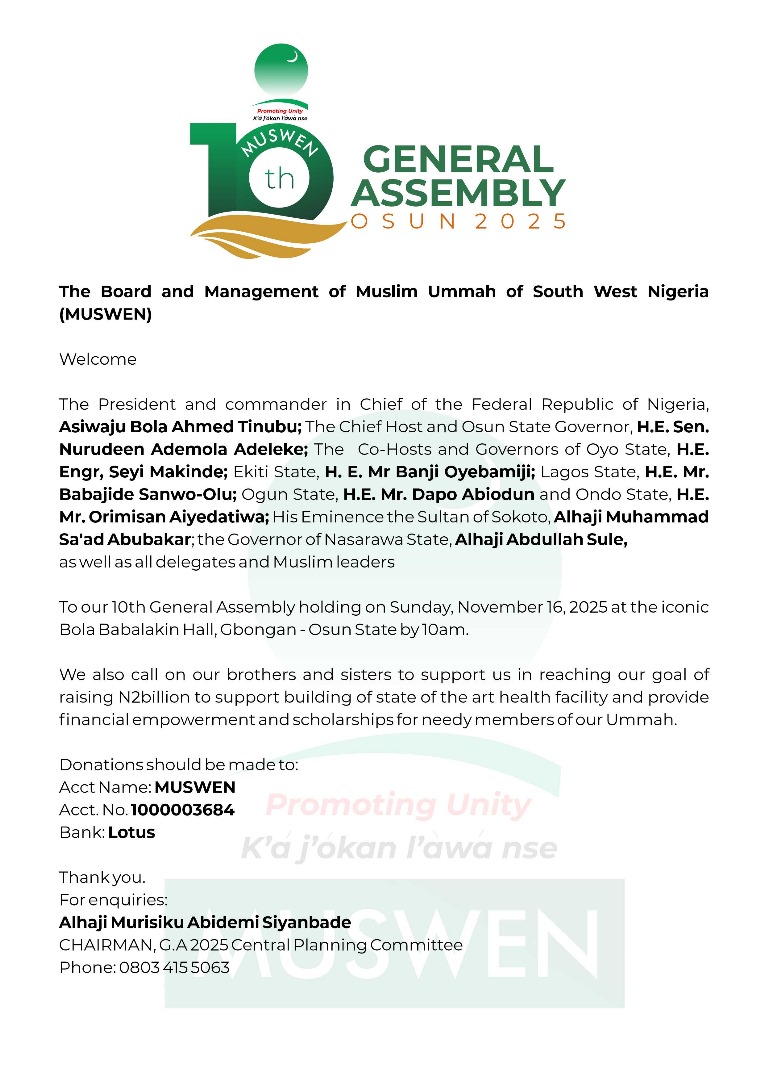A wave of grief swept through the medical community, Muslim Ummah as dignitaries, colleagues, and friends gathered on Saturday, March 29, for the funeral prayers of Dr. Mustapha Faiz Alimi, Consultant Orthopaedic (spine) surgeon special grade 1, and medical director of the National Orthopaedic Hospital, Igbobi, Lagos, NOHIL, who returned to Allah on Friday, March 28, at the age of 57.
In recent years, it seems that I have developed my spirituality to the level that I often face the reality with ease upon receiving news of the demise of a person, that death is truly the only constant thing in life, not even ‘change’ that we attribute the same feature to. There is certainly no human being that will not taste death at the appointed time by the creator.
Regardless of what and who you are, it is evidently clear and sure that at a point you will depart this world. By way of evolution, the pattern used to be that death largely was attributable to age function/quotient, in other words, the presumption, particularly in law, is that the older person will die before the younger person. However, in contemporary times, this theory seems to be fading as death is no more a function of age nor is it a function of good health. The fact that you are young does not shield you from death ; nor would good health insulate you from death. As the young are dying, the old are exiting.
Thus, it is now evidently clear to all and sundry, particularly men of fate, that grace is now the sole determinant of the exiting time. This explains why Dr Mustapha Alimi had to leave us at the unripe age of below sixty years. If it is by age, certainly it will not be his turn but God knows best always. Having said this, permit to state that this is one exceptional death that has crumbled me and exerted tears almost endlessly from me. The justification for this will unfold as I progress in this tribute. Dr Alimi was a great spine surgeon and indeed the President of the spine surgeons till his death.
As known in the public space also, Dr Alimi was the Chief Medical Director of the National Orthopaedic Hospital in Lagos. He trained as a medical doctor at the Ahmadu Bello University and sojourned through the Lagos State General Hospital as a House officer. Fortuitously, he did his youth service at the National Orthopaedic Hospital, Igbobi, a place in which he eventually became the chief executive. He was eventually admitted as a resident doctor and thereafter rose through the ranks to become the Chief Resident Officer in the same orthopaedic hospital. At a point in his career, Dr Alimi was a Registrar at both the National Orthopaedic Hospital and the Lagos University Teaching Hospital in Lagos, and also became Senior Registrar at the former institution.
Thereafter, Dr Alimi was eventually employed as a consultant spine surgeon. Based on his contribution and dedication to the assignments given to him, he was appointed as the Chief Medical Director of the hospital. He had, at various times, served internationally at Algemeines kranken haus der stadt wien, Universitatskilnik fur Orthopadie, Wahringer, Vienna, AUSTRIA and also Schuthess Klinik, Lengghalde 2, Zurich, Switzerland.
This is apart from his service in University Hospital, Ghent, Belgium; in Amrita Institute of Medical Sciences & Research Centre, Kochi, Kerala in India; in Ainshams University, Cairo in Egypt, as a Clinical Fellow in Spine Surgery in Cape Town, South Africa and AO Spine Fellow in Medicabil Hospital, Turkey.
Beyond all these professional engagements, Dr Alimi was a founding member of the Nigerian Spine Society in 2018 and held various important positions in the Society up till his demise as serving President of the Society. For his research acumen, he was appointed the Head of Research, Spine Centers and Fellowships at A. O. Spine West Africa Council. Dr Alimi was reputed as the first professional to establish formal and structured spine training in Nigeria.
In terms of administrative accomplishments, one only needs to visit the National Orthopaedic Hospital in Igbobi, Lagos State to ascertain this. The infrastructural upgrade that the hospital witnessed is second to none. In fact, like one of the commentators at the third-day fidau prayer said, the degree of value addition to the infrastructure in the hospital within his tenure far surpassed all that had been there since inception of the hospital. In terms of human capacity development, the impact was simply invasive, and if I can use the word, ramifying.
Virtually all staff witnessed one form of capacity development or the other. He was the greatest advocate for the upcoming surgeons in terms of training. In this respect, I must not forget the birthing of the College of Nursing in the hospital and also the Federal College of Orthopaedic Technology, which is not only awarding Diploma to higher level but now doing conversion courses to Bachelors Degree. He was a man of great appetite for knowledge, attending several courses, seminars and workshops by way of capacity building and sharpening his skills.
The story of Alimi is simply that of the saying that ‘it is not how far but how well’. From the narrative above on his life and times, it is glaring that within the short space of his existence, Dr Alimi impacted the world and humanity as if he had lived for a century more. If tears at the funeral, including the third day remembrance, is of reckoning, it would have been sufficient to resurrect him.
If it is the quantity and quality of medical attention he received was something to go by, he certainly would have been alive but God, in His myth, demonstrated and actualised His resolve for which are still grateful, anyway. If the story of his good deeds, as recounted by all and sundry globally, is a reference for resurrection, then God would have returned him. If the volume of supplications offered during his ailment is something to note, then certainly, Dr Alimi would not have died. If God was to take account of the multitude of mourners, then Dr Alimi would have returned to us. But all these did not occur as God, his creator knows why he recalled him now.
The only solace we take is that Dr Alimi died in the holiest of months and on the last Friday of the Ramadan fasting period. That, in its own, signifies to us that paradise is his ultimate. Again, as often remarked, the voice of the people is the voice of God. By the testimonies of the people, Dr Alimi has earned paradise from this world and certainly, God will decree it so. Dr Alimi was charity-personified. He lived his life for others. I personally cannot recall the number of patients I referred to him, most of whom he did not ordinarily attend to them in the cause of his professional calling, but used all his God-given resources, including money, to attend and treat them without recourse to me.
That was his life. Dr Alimi never cherished materialism and ended up moving around with a vehicle less deserving of a professional of his status, ignoring for a while the equal status of his amiable wife. His abode in the remote area of Ikorodu, just recently being occupied while spending a greater part of his life is his late father’s house, attests to his humility and less regard for materialism. The office of the Chief Medical Director was of no immense significance to him than his service to humanity. He was truly a classic case of a ‘servant-leader’.
Notwithstanding his commitment to his religion, Islam, he gave to all their fair shares without discrimination. He believed in equity and practised equity. He was a devout Muslim, that was not only virtuous in the practice of his religion, but contributed in no small measure to the growth of the religion in the country. Dr Alimi was a great force in the Islamic Medical Association for which he was Chairman of the Lagos State Chapter till his death. He mobilised materials and resources to meet the needs of the poor in the community.
As I opined earlier, my shedding of tears is not so much about the demise of Dr Alimi, but of the consequences for the system and the associated activities he undertook. The vacuum he left behind seems to be incapable of being filled by anyone readily except Allah enables. While it is true that no one will seem to be indispensable, the truth however is that it takes time in some peculiar circumstances to fill such a lacuna.
One of those instances is this, where the gap left by him appears too wide for anyone to immediately fill. By way of illustration, every Ramadan period, the Islamic Medical Association undertakes free medical sojourn in poor communities by carrying out surgeries and other clinical treatments.
They mobilise resources to meet this obligation without burdening the beneficiaries. The solicitation from the Association had become part of my annual budget but triggered routinely by Dr Alimi through messages and correspondence. Just simply due to his ailment this year, I never received the nod of the Association until I made my way to enquire.
Readily you can see the challenges we shall be experiencing all over. Dr Alimi took no one for granted at any time, either officially or otherwise. He was respectful to all, regardless of status. He was humble to a fault. He was a man of impeccable character whose integrity is unparallelled. He exhibited transparency in all his affairs. Within the short span of his life, Dr Alimi utilised every opportunity at his disposal to impact humanity. He was passionate in anything he did, and his disposition to positivity is infectious.
Two main lessons are instructive from the life of Dr Alimi. The first is that every beneficiary of God’s divine mercy, in terms of wisdom and knowledge, must use it beneficially for humanity. Secondly, that every opportunity you have in life and in whatever capacity you find yourself must be used to benefit humanity. My brother lived a short but impactful life. As much as I grieve over him, I further take solace in the fact that the wife and the children are not different in terms of all the dispositions of our brother. May Allah grant you al Jannah firdaus while granting the family and the entire humanity he considered his calling to serve, the fortitude to bear the irreparable loss.
* Dr. Muiz Adeyemi Banire (SAN), a Notary Public and erudite legal scholar has a doctorate degree in Property Law from the University of Lagos.







